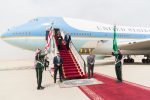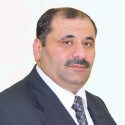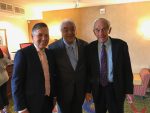Trump signs $110 billion arms deal with Saudis
By Ray Hanania
President Donald J. Trump met with the Custodian of the Two Holy Mosques King Salman bin Abd al-Aziz Al Saud of Saudi Arabia, Crown Prince Mohamed bin Nayef of Saudi Arabia, and Deputy Crown Prince Mohamed bin Salman of Saudi Arabia at the beginning of a week long trip that will also include Israel, Palestine, and the Vatican.
The President’s meetings underscored the deep and longstanding commitment of the United States to the security, stability, and prosperity of Saudi Arabia and demonstrated the President’s confidence in the future of U.S.-Saudi relations. He also emphasized the importance of working jointly to address challenges to regional peace and security, including defeating ISIS and al-Qa’eda, countering Iran’s destabilizing activities, and resolving conflicts in Yemen and Syria.
President Trump and King Salman signed a Joint Strategic Vision Statement promising close collaboration to counter violent extremism, disrupt the financing of terrorism, and advance defense cooperation. Moreover, the President expressed his strong support for Saudi Arabia’s economic reform plans and promoted U.S. companies as ideal partners for Saudi Arabia’s economic transformation, as illustrated by the many deals signed by U.S. companies during the President’s visit.
Secretary of State Rex Tillerson was also there as President Trump and King Salman participated in the signing ceremony for almost $110 billion worth of defense capabilities. This package of defense equipment and services supports the long-term security of Saudi Arabia and the Gulf region in the face of malign Iranian influence and Iranian related threats.
Additionally, it bolsters the Kingdom’s ability to provide for its own security and continue contributing to counterterrorism operations across the region, reducing the burden on U.S. military forces.
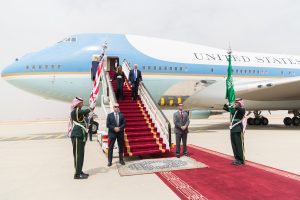
This package demonstrates the United States’ commitment to our partnership with Saudi Arabia, while also expanding opportunities for American companies in the region, potentially supporting tens of thousands of new jobs in the United States.
Trump and Tillerson both stressed that one of their main concerns is the rising influence of Iran and Islamic terrorists in the region, such as Daesh (ISIS).
Additionally, Trump held discussions with the leaders of several neighboring Arab countries while in Saudi Arabia agreeing to scheduled trips and meetings in Egypt, Bahrain, Qatar and Kuwait.
The military package was detailed by Tillerson and the State Department describing it as “a significant expansion of the more than seven-decade long security relationship between the United States and the Kingdom of Saudi Arabia.”
Tillerson attended the signing ceremony for almost $110 billion worth of defense capabilities to be conveyed via Foreign Military Sales Letters of Offer and Acceptance and a Memorandum of Intent to support Saudi Arabia’s defense needs.
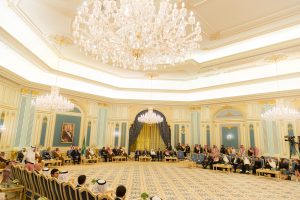
This package of defense equipment and services supports the long-term security of Saudi Arabia and the Gulf region in the face of malign Iranian influence and Iranian related threats. Additionally, it bolsters the Kingdom’s ability to provide for its own security and continue contributing to counterterrorism operations across the region, reducing the burden on U.S. military forces.
This package demonstrates the United States’ commitment to our partnership with Saudi Arabia, while also expanding opportunities for American companies in the region, potentially supporting tens of thousands of new jobs in the United States.
The intended sales fall broadly into five categories: border security and counterterrorism, maritime and coastal security, air force modernization, air and missile defense, and cybersecurity and communications upgrades. Included are offers of extensive training and support to strengthen our partnership and the Saudi armed forces.
Collectively, they present the opportunity to significantly augment the Kingdom of Saudi Arabia’s capabilities to help deter regional threats and enhance its ability to protect its borders and contribute to coalition counterterrorism operations.
Border Security and Counter Terrorism: Capabilities such as aerostats, tanks, artillery, counter-mortar radars, armored personnel carriers, helicopters, and associated training that will enable Saudi Arabia to secure its borders against terrorist and other threats.
Maritime and Coastal Security: Capabilities that will enable Saudi Arabia to defend freedom of navigation and to deter and defend against maritime attacks or incursions. Systems include Multi-Mission Surface Combatant ships, helicopters, patrol boats, and associated weapons systems.
Air Force Modernization: Systems, sustainment, and training that will enable Saudi Arabia to maintain airborne surveillance, secure its airspace, and provide close air support with improved precision targeting capabilities and processes. Systems include transport, light close air support, intelligence-gathering aircraft, and continuing support for its existing platforms.
Air and Missile Defense: Systems such as Patriot and THAAD that will help Saudi Arabia protect itself and the region from missile or other airborne attacks.
Cybersecurity and Communications: Equipment that will modernize Saudi Arabia’s command and control networks across its military to improve its overall cohesion and operational effectiveness.
Trump’s seven-day foreign trip began Saturday May 20, 2017 and includes meetings with Israel’s Prime Minister Benjamin Netanyahu in Israel, and with Palestinian President Mahmoud Abbas in Bethlehem in the Israeli occupied Palestinian territories. Trump will also travel to the Vatican and meet with the Pope and then to Belgium before returning to the United States on Saturday May 27, 2017.
(Including reports from the White House and State Department.)


- Israelisnipers shooting and killing hospital workers in Gaza - December 11, 2023
- CAIR Condemns Israeli Executions of Wounded, Unarmed Palestinian in West Bank - December 11, 2023
- Arab and Muslim American voters face a “simple choice” between Biden’s inhumanity and Trump’s edgy politics - December 9, 2023













